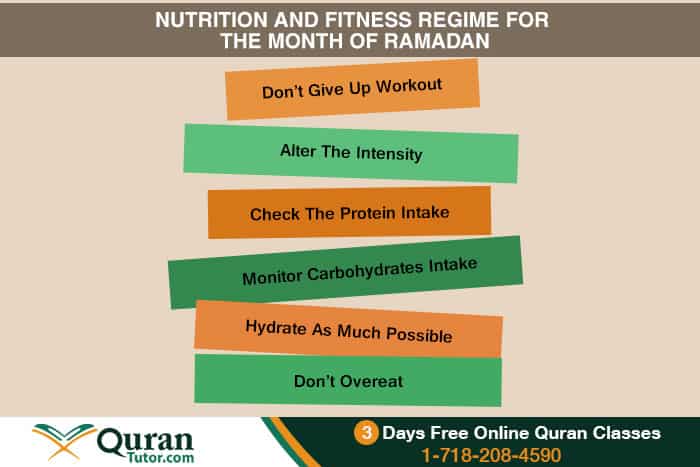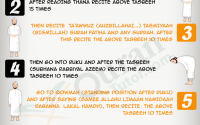Nutrition And Fitness Regime For The Month Of Ramadan
The month of Ramadan is upon us. It is one of the most blessed months of Islamic calendar that comes with fasting, praying, and worshiping of Allah Almighty. Therefore, the one of the prime objectives of a Muslim in this month is to change the daily routine a little and spend more time in worshiping of Allah. Thus, it is obvious that Ramadan comes with a change in the routine as well as the attitude of the Muslims.
Besides the fact that Ramadan comes with change in routine of doing daily chores, the other area of life which Ramadan affects the most and which is altered heavily is the health and nutrition aspect. With Ramadan comes fasting from dawn till dusk, therefore, it gives a total makeover to the daily health and nutrition routine.

People don’t take care of their nutrition routine and give it all up during Ramadan and become careless about their health, as a result of which they take a heavy dent in terms of their fitness and health. The lines below discuss some general tips that can help in maintaining a good health and nutrition plan during the month of Ramadan.
Don’t Give Up Workout:
The biggest mistake which people commit pertaining to health and fitness in the month of Ramadan is that they give up their workout and don’t do any work out during the whole month. This is done by people who throughout the year give proper time to their health and fitness, yet when the time of Ramadan comes they think that they cant adjust a workout in their routine, cant bear it or they need to give it a break for a month. This approach is definitely wrong, as Ramadan means alteration of routine and not abandoning it. Therefore, whether you are doing muscle building or cardio training, you don’t need to leave it, rather you have to find the best time throughout the day in which you can perform a normal workout. Therefore, don’t leave workout, rather adjust it somewhere in your routine.
Alter The Intensity:
There are people who totally leave their workout during Ramadan and there are others who make the mistake of keep on performing the same workouts with the same intensity. When they continue on doing the workout without bringing the intensity down, it ultimately results in them injuring themselves, as during Ramadan fasting causes a lot of energy to drain, therefore, performing the same intense workout does not end well for people. Therefore, you must perform workout during Ramadan, however, change its intensity a little and bring it down a bit so that you don’t make it too hard for your body which is already running on low energy reserves. Ergo, if you are doing weight training, bring the weights a little down and if you are doing cardio try cutting on the mileage and intensity during Ramadan to ensure that your health and fitness goal does not get disturbed and you stay healthy.
Check The Protein Intake:
All the muscle builders know and understand the importance of protein intake. It is the building block of the body and is an integral nutrition component when it comes to keeping the muscle mass and helping the body grow. Therefore, to keep the body healthy during Ramadan, it is imperative that sufficient proteins be provided to it when it lacks it the most, hence, the right time for protein intake in the month of Ramadan is at the time of Iftaar. Therefore, if you are conscious about your general health and want to assist your muscle-building workout later in the evening, then take protein rich foods at the time of Iftaar. Drink milk, eat meat or use protein rich vegetables and fruits during Iftaar to compensate for all the protein lost during the fast and replenish it for muscle building purpose.
Carbohydrates Intake:
The second necessary element required for the health of the body in general and from the workout and fitness perspective in particular is carbohydrates. You need to check your carbohydrates intake as well to ensure that your body does not run out of it as it is one of the fuel on which the body works. Although you can refuel your body with carbs at the time of Iftaar, however, it is the time during the fast when body is low on carbs and craves for them. As it is evident that you cannot eat during fast, therefore, the best ploy in this regard is to eat them at the time of Suhoor. Moreover, pertaining to carbs, there are simple and complex carbs, the former digest quickly and deplete, whereas the latter take quite some time to digest and deplete, therefore, Suhoor carbs consumption must comprise of complex carbs so that the body has fuel available for longer part of the fast and it does not start burning muscles as an energy source.
Hydrate As Much Possible:
In addition to eating, the other thing forbidden during a fast is drinking, therefore, it is quite natural that because of less water intake, the hydration levels fall down. It is one of the major reasons why most of the people fall for drinking something at first when they do Iftaar. However, the problem is that once people satiate their thirst, in the later parts of night they don’t go for drinking enough water that again results in hydration and makes performing workout difficult. Therefore even after the Iftaar, you must ensure that you must drink sufficient water to bring your hydration levels to normal, which will definitely help you in performing a good workout and sticking to your workout routine.
Don’t Overeat:
Perhaps the biggest reason why people face health and fitness problems during and after it is long gone is the fact that people overeat during Ramadan. People eat heavily during Suhoor when they are under the impression that they have to go through the whole day without eating anything, and they also eat heavily at Iftaar under the impression that they have starved all day. This overeating, in addition to causing you to gain weight overeating also causes hinderance in your workout as well because it causes your stomach to upset, which makes it difficult to perform the workout in a normal manner.
Recommended Reading – How to Bring Taste on the Table – Suhoor & Iftar Tips
Conclusion:
In a nutshell, Ramadan is no excuse to avoid your health and fitness regime. Moreover, nor should a Muslim try following the same workout and nutrition regime during Ramadan as it might not go good with fasting. Therefore, neither should be the regime abandoned nor strictly be glued upon, rather alteration in moderation should be undertaken to ensure a healthy and fit Ramadan.









